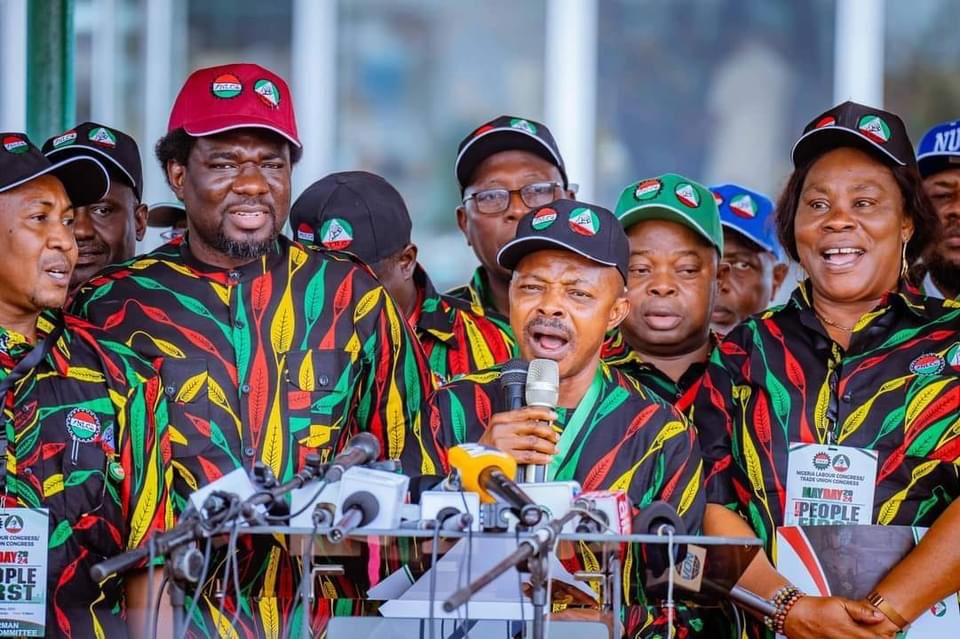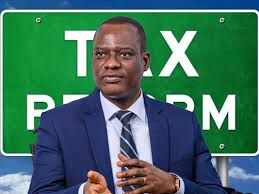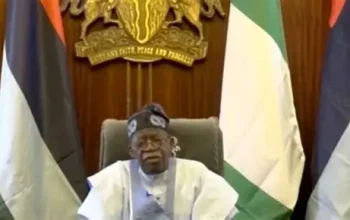The Nigeria Labour Congress (NLC) and the Trade Union Congress (TUC) have abandoned minimum wage negotiations with the Federal Government after the latter proposed a minimum wage of N48,000. This amount is significantly less than the N615,000 demanded by the unions.

Following the abrupt end to the negotiations, labor leaders held an emergency press conference to express their frustration, labeling the government’s offer as “an insult to the sensibilities of Nigerian workers.”
Unions Call Government’s Offer a Wage Reduction, Insist on N615,000
This marks the second time in two weeks that negotiations have stalled. The previous session on April 29 ended without an agreement, with labor insisting on a N615,000 minimum wage. The Federal Government, deeming this demand unreasonable, has yet to meet labor’s expectations.
NLC President Joe Ajaero explained that the N615,000 figure was determined based on the current economic conditions and the needs of an average Nigerian family of six. He emphasized that a living wage should be one that enables workers to meet basic needs without becoming poorer.
Breakdown of the N615,000 Demand
Ajaero provided a detailed breakdown of how the N615,000 figure was calculated:
- Housing and accommodation: N40,000
- Electricity: N20,000 (calculated before the current tariff increase)
- Utilities: N10,000
- Kerosene and gas: N25,000 to N35,000
- Food for a family of six: N9,000 per day, totaling N270,000 per month
- Medical expenses: N50,000 (insufficient for surgeries or major treatments)
- Clothing: N20,000
- Education: N50,000
- Sanitation: N10,000
- Transportation: N110,000 (due to high petrol costs)
Ajaero stressed that the proposed amount was based on a thorough analysis and questioned if any savings would be possible with this living wage.
Private Sector’s Role and Government’s Shortcomings
During the press conference, Ajaero revealed that the organized private sector initially proposed N54,000, slightly higher than the government’s N48,000. He criticized both the government and the private sector for their roles in the negotiation breakdown.
Ajaero pointed out that even the lowest-paid private sector workers receive N78,000, highlighting a significant disparity. He accused the government of undermining the credibility of the negotiations by failing to provide data to support their proposal.
The current minimum wage, set at N30,000, is augmented by a 40% allowance (N12,000) and a N35,000 wage award, totaling N77,000. Ajaero argued that accepting the N48,000 proposal would effectively reduce federal workers’ income, which is unacceptable.
Commitment to Workers’ Rights
Ajaero concluded by reaffirming the unions’ commitment to fighting for Nigerian workers’ rights and interests. He called on the government to negotiate in good faith and to reconsider the unions’ proposed N615,000 minimum wage.
The Presidency and the Minister of Information had not responded to inquiries at the time of this report.
Government and Labor History
The Tripartite Committee on Minimum Wage, chaired by former Head of the Civil Service Goni Aji, was inaugurated by Vice President Kashim Shettima on January 30, 2024. The committee, which includes federal and state governments, the private sector, and organized labor, was tasked with recommending a new national minimum wage before the current N30,000 wage’s expiration on April 18.
During its inauguration, Shettima urged the committee to expedite their resolution. Public hearings were held in various regions, with different states proposing various figures as a living wage, ranging from N447,000 to N850,000.
Organized Private Sector’s Response
The Nigeria Employers’ Consultative Association (NECA) has urged labor leaders to return to the negotiation table. NECA’s Director-General, Adewale-Smatt Oyerinde, described the walkout as premature and potentially delaying the committee’s assignment. He called for continued negotiations to reach a fair and sustainable minimum wage.
Economic Experts Weigh In
Economic experts have criticized the government’s N48,000 proposal. Dr. Ikenna Nwosu from the Nigerian Economic Summit Group and Professor Akpan Ekpo both argued that the proposed amount is inadequate given the current economic situation and inflation rate of 33.6%.
Auwal Rafsanjani, Executive Director of the Civil Society Legislative Advocacy Centre, emphasized the need for a dignified living wage to reduce corruption and inequality. He also highlighted the importance of monitoring workers’ productivity to justify wage increases.
Calls for Middle Ground
Emmanuel Onwubiko, National Coordinator of the Human Rights Writers Association of Nigeria, suggested a middle-ground approach. He noted that the government seems uninterested in genuine negotiations, evidenced by the absence of a substantive Minister of Labour following a controversial court ruling.
Debo Adeniran, Chairman of the Centre for Accountability and Open Leadership, proposed that N200,000 would be a more reasonable minimum wage, considering current economic conditions.
In summary, the labor unions remain firm in their demand for a substantial increase in the minimum wage, reflecting the harsh economic realities faced by Nigerian workers. The ongoing impasse underscores the need for transparent and good-faith negotiations to arrive at a fair and sustainable resolution.
Read also:
- EFCC arrests 23 internet fraudsters in Enugu
- “See Ur Life”: Portable’s Baby Mama Honey Berry Taunts Him Over Disgraceful Arrest, Fans React
- Second Largest Private Refinery in Nigeria After Dangote Nearing Completion with $360 Million Investment, Prepares to Fuel the Nation
- PICTORIAL: Car sale agreement that led to Portable’s arrest
- Tinubu, VP Shettima to pay tollgate fees at airports
- FG Petitions IGP, Drags Niger Speaker to Court Over Moves To Marry Off 100 Girls
- RCCG Pastor Adeboye comment on How God dealt with billionaires who queried him over their tithe
- FG plans performance-based salary scheme for workers
- AMVCA 2024: Funke Akindele, Toyin Abraham, Other Celebs Turn Heads With Outfits at Award Ceremony
- Former Minister Solomon Dalung Abandoned in Hospital Over N80,000 Bill
- FULL LIST: AMVCA 2024 nominations
- EFCC stops dollar transactions, asks embassies to charge in naira
- Alex Otti likens political parties to churches as PDP chieftains defect to APC in Abia
- New Court Ruling Increases Tension in Yahaya Bello vs EFCC Case
- Prince Harry, Meghan arrive Nigeria Defence Headquarters
- How to identify when a child is being bullied



